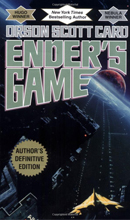
Ender’s Game
by Orson Scott Card
“Whatever your gravity is when you get to the door, remember — the enemy’s gate is down. If you step through your own door like you’re out for a stroll, you’re a big target and you deserve to get hit. With more than a flasher.” Ender Wiggins paused and looked over the group. Most were just watching him nervously. A few understanding. A few sullen and resisting.”
So begins a short story published in the August 1977 edition of Analog magazine. It was the story of a six year old boy taken from his family and sent to the Battle School orbiting Jupiter to train with other children for a coming battle with an alien race on its way to attack Earth and destroy humanity.
That short story became the international best seller Ender’s Game. Today it is widely read by adults and young people alike, in college English and Sociology classes and in homes around the world. Even in Serbia…in Serbian, one of numerous translations published over the years. The book won its author, Orson Scott Card, honors as the Nebula and Hugo award winner. But from the moment you begin reading, you realize instantly that this is not a work of science fiction as much as a work of morality and sociology. Card affords generations of readers questions to discuss about right and wrong, necessity, politics, and lost youth. Histories can tell us what a researcher found to have happened at a particular time. Orson Scott Card gives us the opportunity to discuss what we would do in a situation that hasn’t yet happened.
So much of what we study and discuss in any profession, from law, to banking, to academia, to first response can be found in Ender’s Game. Near the end of the book, the protagonist, Ender, finds that as he trains for the looming battle to save humanity his subordinate commanders, his friends, get better, but they become more distant from him. That is something that happens in real life. Some of his subordinates crack when they are pushed beyond their capabilities to cope while others pull him along. He has to deal with strategy, a thinking, adaptive adversary, and personal interactions with his people. As his losses mount, he has to compensate and think critically.
In the early 1800’s Scharnhorst and Clausewitz were among the group of leading Prussian reformers who established the system of professional military education, life-long professional development, and a general staff that managed this process of ensuring that senior leaders have the brains behind the might of their armies when fighting wars. This model applies to business just as it does to militaries. In a large sense, we are all their intellectual descendants.
But were Ender Wiggin and his fellow children who were taken fromt heir parents and trained to defend humanity their descendants? I have heard countless conversations in hallways and during meals over the past decade between graduate students, faculty and business professionals that ask variations of the same question: Are we as modern professionals different from the Battle School of Ender’s Game in kind or are we different in degree?
I’ll leave you to ponder that question and to discuss it with your fellow professionals and reading group friends. In the mean time, I’ll recommend you critically read Ender’s Game. But also pick up one of Scott Card’s other books as well. Card has also written in the genres of contemporary fantasy, alternative history, Biblical novels, classic science fiction and a collection of poetry. He writes and directs plays for a local community theater and teaches writing to aspiring authors.

Leave A Comment